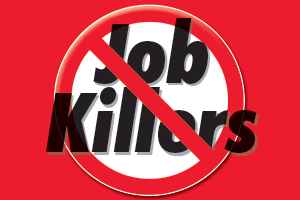With a little over a week left in the legislative session, a California Chamber of Commerce-opposed bill that could increase health care premiums, deductibles, and out-of-pocket costs for millions of enrollees and purchasers in order to reduce their out-of-pocket costs for prescription drugs is awaiting a vote on the Senate Floor.
AB 339 (Gordon; D-Menlo Park) could drive up health care premiums by severely restricting the ability of health plans and pharmacy benefit managers to control health care costs on behalf of purchasers through their prescription drug benefit designs, and also places strict caps on prescription drug copayments.
Negotiating Lower Drug Prices
Drug makers generally offer their biggest discounts on drugs when health plans/pharmacy benefit managers (PBMs) “prefer” one drug over its therapeutic competitors by assigning it to a lower cost-sharing tier on their formularies. This preferred placement gives drug makers a competitive advantage because enrollees are more likely to choose a drug assigned to a lower cost tier than its competitors to save money.
In fact, drug makers are willing to offer deep discounts and rebates to earn this preferred status. Rebates from drug makers are expected to save California purchasers $6-12 billion over the next five years, but AB 339 threatens to eliminate much of that potential savings.
AB 339 will interfere with price negotiations between plans/PBMs and drug makers by:
- Capping cost-sharing requirements for formulary prescription drugs – minimizes the difference in cost between drugs on a lower tier and those on a higher tier, reducing the incentive enrollees have to choose a better-placed drug over its competitor in a higher cost tier.
- Capping cost-sharing requirements for nonformulary prescription drugs – drugs excluded from a health plan’s/PBM’s formulary would be priced the same as competing drugs on the formulary, further reducing the value of preferred placement on a formulary.
- Capping pharmacy deductibles – prevents health plans/PBMs from directing to drug deductibles the extra costs incurred due to AB 339. Instead, they must direct these costs to other benefits in the plan that may be more important to enrollees, such as requiring higher co-payments for doctor’s visits or increasing the hospital deductible.
- Mandating coverage for expensive single-tablet antiretroviral drugs even when they are no more effective or likely to result in adherence than a cheaper multi-tablet regimen – allows manufacturers of single-tablet antiretroviral drugs to charge more for their products without jeopardizing their spot on a plan’s formulary, and reduces the incentive for manufacturers of multi-tablet regimens to offer better discounts.
- Imposing strict definitions for drug formulary tiers and prohibiting more than four tiers – limits the ability of health plans/PBMs to build in other types of preferential treatment for drug manufacturers willing to offer substantial discounts or rebates. It also gives some drug makers a competitive advantage over others without having to reduce their price.
Action Needed
Prescription drug spending is the fastest growing cost in the health care system today, and new, more expensive drugs are entering the market all the time.
Costs for purchasers and enrollees are bound to rise no matter what, but AB 339 will ensure that the cost increase happens much faster.
The CalChamber is urging its members to contact their senators and ask them to oppose AB 339.
Staff Contact: Mira Morton



